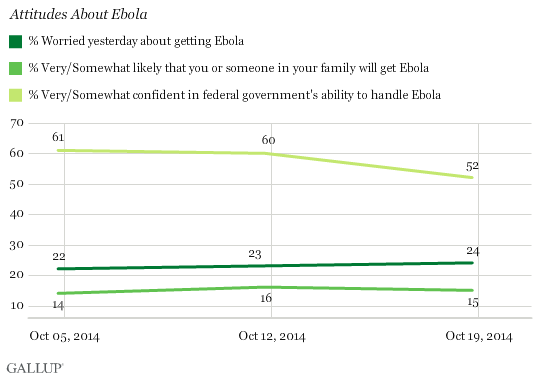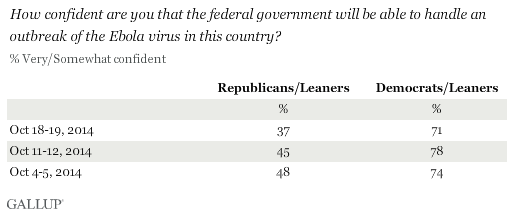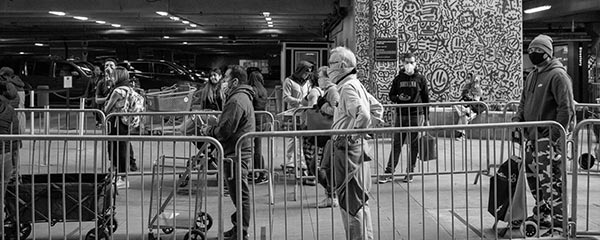Story Highlights
- Confidence in gov't to handle Ebola down to 52% from 61%
- No change in the percentage of Americans worried about getting Ebola
- Drop in confidence more apparent among Republicans
PRINCETON, NJ -- Americans are no more worried about getting Ebola now than they were two weeks ago, but they have become somewhat less confident in the federal government's ability to deal with an outbreak of the virus. Fifty-two percent of Americans are now very or somewhat confident in the government's ability to handle Ebola, down from 61% in early October.

Twenty-four percent of Americans say they worried yesterday about getting Ebola, little changed from 22% two weeks ago. Similarly, the percentage believing it is at least somewhat likely that they or someone in their family will get Ebola has also remained stable, now at 15%.
The drop in Americans' confidence in the federal government to handle the Ebola situation has occurred in part because the issue has become politicized. Republicans were already less confident than Democrats in the government's ability to handle Ebola two weeks ago, but the gap between the two has grown larger. Now, 37% of Republicans are confident in the government compared with 71% of Democrats; two weeks ago, 48% of Republicans and 74% of Democrats were confident in the government's ability to handle an Ebola outbreak.

In recent days, several Republican Senate and House candidates running for election have adopted criticisms of the administration's response to the Ebola situation as talking points in their campaign, and rank-and-file Republicans appear to have picked up on this theme. Perhaps in reaction to these criticisms, and to give Democratic candidates something concrete to point to, President Barack Obama on Friday appointed Ron Klain as "Ebola czar" to head up the government's efforts to address Ebola. However, Republicans have responded with criticisms of that appointment as well, including Arizona Sen. John McCain's questions about the fact that Klain lacks a medical background and has mainly served as a high-ranking assistant to Democratic officeholders during his professional career.
Few Americans Think Ebola Will Be a Crisis or Major Outbreak
Most Americans continue to say that the Ebola virus ultimately will not strike the U.S. at all -- even though cases have already been reported in the U.S. -- or predict only a minor outbreak. Two in 10 now say it will be a major outbreak or a crisis. These attitudes are similar to those measured two weeks ago.

Implications
The Ebola situation has been a constant presence in news coverage over the past two weeks. The first person diagnosed with Ebola in the U.S. died in a Dallas hospital, and two American healthcare workers were identified as having contracted the virus. Politicians and pundits have debated possible travel bans and immigration restrictions.
Throughout all of this, Americans' concerns about getting the virus have remained stable, and have been similar to their worries about contracting swine flu five years ago. Further, few Americans appear worried that Ebola will spread to the point of producing a major outbreak or a crisis in the U.S.
Over the last two weeks, however, the American public has lost some confidence in the federal government's ability to handle Ebola, although the confidence level still remains at a majority level. It is mainly Republicans who have lost confidence in the government to handle Ebola, suggesting that this health and medical situation -- as is the case with so much else in American society today, particularly during election season -- has become a politicized issue.
Survey Methods
Results for this Gallup poll are based on telephone interviews conducted Oct. 18-19, 2014, on the Gallup U.S. Daily survey, with a random sample of 1,017 adults, aged 18 and older, living in all 50 U.S. states and the District of Columbia. For results based on the total sample of national adults, the margin of sampling error is ±4 percentage points at the 95% confidence level.
Each sample of national adults includes a minimum quota of 50% cellphone respondents and 50% landline respondents, with additional minimum quotas by time zone within region. Landline and cellular telephone numbers are selected using random-digit-dial methods.
View complete question responses and trends.
Learn more about how the Gallup U.S. Daily works.

